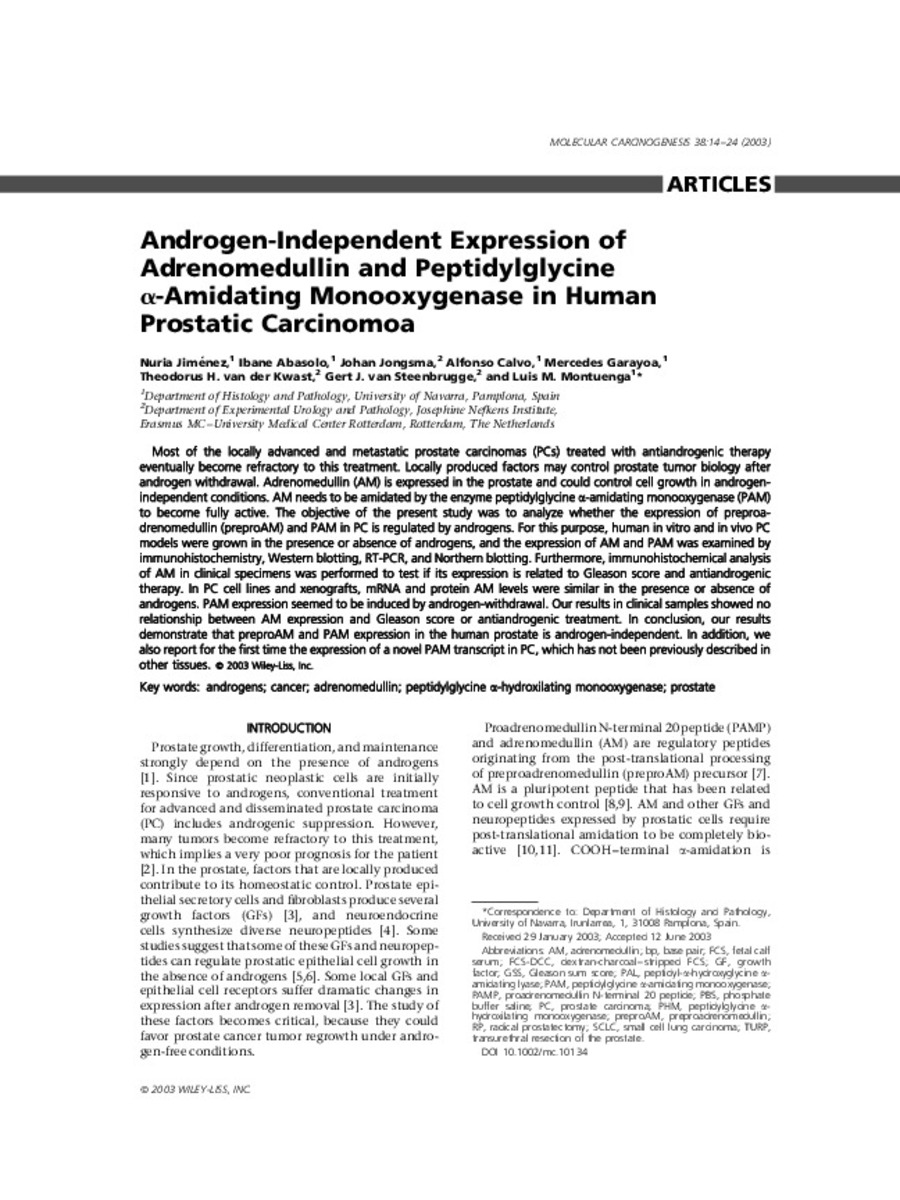Full metadata record
| DC Field | Value | Language |
|---|---|---|
| dc.creator | Jimenez, N. (Nuria) | - |
| dc.creator | Abasolo, I. (Ibane) | - |
| dc.creator | Jongsma, J. (Johan) | - |
| dc.creator | Calvo-González, A. (Alfonso) | - |
| dc.creator | Garayoa, M. (Mercedes) | - |
| dc.creator | Kwast, T.H. (Theodorus H. ) van der | - |
| dc.creator | Steenbrugge, G.J. (Gert J.) van | - |
| dc.creator | Montuenga-Badia, L.M. (Luis M.) | - |
| dc.date.accessioned | 2011-12-12T08:56:46Z | - |
| dc.date.available | 2011-12-12T08:56:46Z | - |
| dc.date.issued | 2003 | - |
| dc.identifier.citation | Jimenez N, Abasolo I, Jongsma J, Calvo A, Garayoa M, van der Kwast TH, et al. Androgen-independent expression of adrenomedullin and peptidylglycine alpha-amidating monooxygenase in human prostatic carcinoma. Mol Carcinog 2003 Sep;38(1):14-24. | es_ES |
| dc.identifier.issn | 1098-2744 | - |
| dc.identifier.uri | https://hdl.handle.net/10171/20180 | - |
| dc.description.abstract | Most of the locally advanced and metastatic prostate carcinomas (PCs) treated with antiandrogenic therapy eventually become refractory to this treatment. Locally produced factors may control prostate tumor biology after androgen withdrawal. Adrenomedullin (AM) is expressed in the prostate and could control cell growth in androgen-independent conditions. AM needs to be amidated by the enzyme peptidylglycine alpha-amidating monooxygenase (PAM) to become fully active. The objective of the present study was to analyze whether the expression of preproadrenomedullin (preproAM) and PAM in PC is regulated by androgens. For this purpose, human in vitro and in vivo PC models were grown in the presence or absence of androgens, and the expression of AM and PAM was examined by immunohistochemistry, Western blotting, RT-PCR, and Northern blotting. Furthermore, immunohistochemical analysis of AM in clinical specimens was performed to test if its expression is related to Gleason score and antiandrogenic therapy. In PC cell lines and xenografts, mRNA and protein AM levels were similar in the presence or absence of androgens. PAM expression seemed to be induced by androgen-withdrawal. Our results in clinical samples showed no relationship between AM expression and Gleason score or antiandrogenic treatment. In conclusion, our results demonstrate that preproAM and PAM expression in the human prostate is androgen-independent. In addition, we also report for the first time the expression of a novel PAM transcript in PC, which has not been previously described in other tissues. | es_ES |
| dc.language.iso | eng | es_ES |
| dc.publisher | Wiley Blackwell | es_ES |
| dc.rights | info:eu-repo/semantics/openAccess | es_ES |
| dc.subject | Androgens | es_ES |
| dc.subject | Cancer | es_ES |
| dc.subject | Adrenomedullin | es_ES |
| dc.subject | Peptidylglycine a-hydroxilating monooxygenase | es_ES |
| dc.subject | Prostate | es_ES |
| dc.title | Androgen-independent expression of adrenomedullin and peptidylglycine alpha-amidating monooxygenase in human prostatic carcinoma | es_ES |
| dc.type | info:eu-repo/semantics/article | es_ES |
| dc.relation.publisherversion | http://onlinelibrary.wiley.com/doi/10.1002/mc.10134/abstract | es_ES |
| dc.type.driver | info:eu-repo/semantics/article | es_ES |
Files in This Item:
Statistics and impact
Items in Dadun are protected by copyright, with all rights reserved, unless otherwise indicated.






